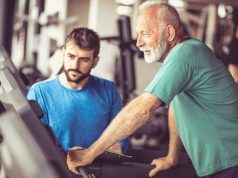The American Heart Association’s 2015 Scientific Sessions
The annual meeting of the American Heart Association was held from Nov. 7 to 11 in Orlando, Fla., and attracted more than 19,000 participants from around the world, including cardiologists, cardiovascular surgeons, nurses, and other health care professionals. The conference featured presentations focusing on the latest advances in cardiovascular medicine and surgery.
In one study, Yitschak Biton, M.D., of the University of Rochester Medical Center in New York, and colleagues found that several clinical variables together with genetic data can be used to improve patient selection for primary prevention with implantable cardioverter defibrillator (ICD) in high-risk individuals with long QT syndrome. The variables identified included QTc duration, history of prior syncope while on β-blocker treatment, and LQT2 genotype and multiple mutations.
“Higher score based on those variables was associated with gradually increased risk for both the first appropriate shock and recurrent appropriate shocks,” Biton said. “Our data can be used for patient selection for primary prevention with ICD and to reduce the burden of inappropriate therapy.”
Several authors disclosed financial ties to Boston Scientific.
Abstract No. 17128
In another study, Audrey L. Blewer, M.P.H., of the University of Pennsylvania in Philadelphia, and colleagues compared video-only cardiopulmonary resuscitation (CPR) training (no manikin) to standard training with a manikin (video self-instruction [VSI] training). The investigators found that video-only training yielded a statistically indistinguishable difference in chest compression rate compared to VSI training. Mean chest compression depth was significantly lower in the video-only group.
“Given these findings, we would like to examine what we view as the trade-off. While video-only training may yield shallower chest compression depth, there is the potential for broader dissemination. While VSI kit training may yield deeper chest compression depth, the reach, or education penetration, may be more limited due to the higher cost and the need for a manikin,” Blewer said. “One must examine the goals of your education program and decide what is best for your program.”
Several authors disclosed financial ties to Modest, Resuscor, Physio-Control, Medtronic, Zoll Medical, and/or Philips Healthcare.
Abstract No. 15569
Ritesh S. Patel, M.D., of the University of Florida in Gainesville, and colleagues compared the HeartBuds smartphone compatible stethoscope to three other stethoscope models, including two for professional health care providers and another that was a generic disposable stethoscope that is often used in intensive care units and other areas where infection risk is a concern. The investigators found the HeartBuds stethoscope to be comparable to the professional models in quality. All three were superior to the disposable stethoscope in picking up different sounds in the body.
“The conclusion is that HeartBuds performed significantly better than the disposable model, and comparably to professional stethoscope models. As far as impact on clinical practice, we envision the HeartBuds being used as a replacement for disposable stethoscopes and we plan to do a future study on whether using the HeartBuds device in high-risk units of the hospital can actually reduce infection rates. It can be produced at a comparable price to disposable stethoscopes, yet have superior ability to pick up the sounds physicians are listening for,” Patel said. “Additionally, it can be a vital part of any telemedicine package as it can record patients’ sounds in the field and send them to physicians remotely.”
Abstract No. 14852
Michelle S. Wong, a Ph.D. candidate at Johns Hopkins University in Baltimore, and colleagues implemented a Teaching Gardens program in elementary schools in Title I schools that serve low-income populations. The program was a multi-level intervention that aimed to increase healthy dietary and physical activity behaviors in fourth- and fifth-grade students.
“The program was conducted over the course of a school year. Compared to baseline (i.e., at the start of the school year), we saw improvements in children’s knowledge of healthy dietary behaviors and physical activity behavior at the end of the school year,” Wong said. “We are encouraged that the Teaching Garden program seems to be a promising way to increase children’s knowledge of and behaviors related to healthy diet and physical activity.”
AHA: Andexanet Alfa Can Reverse Effect of Factor Xa Inhibitors
WEDNESDAY, Nov. 11, 2015 (HealthDay News) — Andexanet alfa (andexanet) can reverse the anticoagulant effects of factor Xa inhibitors, according to a study published online Nov. 11 in the New England Journal of Medicine to coincide with the annual meeting of the American Heart Association, held from Nov. 7 to 11 in Orlando, Fla.
AHA: Gender Disparity in Cardiologists’ Salaries
WEDNESDAY, Nov. 11, 2015 (HealthDay News) — Male and female cardiologists have different job activities and salaries, with women having a lower salary than expected, according to a study published online Nov. 8 in the Journal of the American College of Cardiology . The research was published to coincide with the annual meeting of the American Heart Association, held from Nov. 7 to 11 in Orlando, Fla.
AHA: Infrequent Monitoring for Heart Failure Patients on MRAs
WEDNESDAY, Nov. 11, 2015 (HealthDay News) — Patients with heart failure initiating mineralocorticoid receptor antagonists (MRAs) are rarely monitored in accordance with guidelines. The findings were published in the Nov. 10 issue of the Journal of the American Medical Association, a cardiovascular disease theme issue published to coincide with the annual meeting of the American Heart Association, held from Nov. 7 to 11 in Orlando, Fla.
AHA: Short, Intense Bouts of Exercise More Beneficial in T2DM
TUESDAY, Nov. 10, 2015 (HealthDay News) — Short sessions of high-intensity exercise may provide more health benefits for people with type 2 diabetes than longer bouts of less intense activity, according to a study scheduled to be presented at the annual meeting of the American Heart Association, held from Nov. 7 to 11 in Orlando, Fla.
AHA: Combo Tx Ups Benefits in Intermittent Claudication
TUESDAY, Nov. 10, 2015 (HealthDay News) — Combination therapy of endovascular revascularization and supervised exercise is associated with greater improvements than supervised exercise alone for patients with intermittent claudication. The findings were published in the Nov. 10 issue of the Journal of the American Medical Association, a cardiovascular disease theme issue published to coincide with the annual meeting of the American Heart Association, held from Nov. 7 to 11 in Orlando, Fla.
AHA: Reducing Blood Pressure Target Could Increase Benefits
TUESDAY, Nov. 10, 2015 (HealthDay News) — At least 16.8 million Americans could potentially benefit from the type of aggressive blood pressure treatment pursued under the Systolic Blood Pressure Intervention Trial (SPRINT). The findings were published online Nov. 9 in the New England Journal of Medicine to coincide with presentation at the annual meeting of the American Heart Association, held from Nov. 7 to 11 in Orlando, Fla.
AHA: Women More Often Receive Suboptimal Post-MI Care
TUESDAY, Nov. 10, 2015 (HealthDay News) — Women are less likely than men to get the recommended treatments for myocardial infarction (MI) survivors, and that could explain much of the gender gap in long-term survival, according to research scheduled for presentation at the annual meeting of the American Heart Association, held from Nov. 7 to 11 in Orlando, Fla.
AHA: Many Patients Worried About Sex Post ICD Implantation
MONDAY, Nov. 9, 2015 (HealthDay News) — For most patients with an implantable cardiac defibrillator (ICD), it’s safe to resume sexual activity once the surgical site has healed, according to research presented at the annual meeting of the American Heart Association, held from Nov. 7 to 11 in Orlando, Fla.
AHA: Many Americans Experiencing Unrecognized MIs
MONDAY, Nov. 9, 2015 (HealthDay News) — New research suggests that many Americans are suffering silent myocardial infarctions. The study appears in the Nov. 10 issue of the Journal of the American Medical Association, a cardiovascular disease theme issue published to coincide with the annual meeting of the American Heart Association, held from Nov. 7 to 11 in Orlando, Fla.
AHA: One Energy Drink Ups Blood Pressure, Norepinephrine Levels
MONDAY, Nov. 9, 2015 (HealthDay News) — Just one energy drink can cause potentially harmful spikes in both stress hormone levels and blood pressure in young, healthy adults, a new study shows. The findings were published as a research letter online Nov. 8 in the Journal of the American Medical Association to coincide with the annual meeting of the American Heart Association, held from Nov. 7 to 11 in Orlando, Fla.
AHA: Home Cooking Linked to Lower Risk of Type 2 Diabetes
MONDAY, Nov. 9, 2015 (HealthDay News) — More home-cooked meals may equal lower risk of type 2 diabetes, according to research scheduled to be presented at the annual meeting of the American Heart Association, held from Nov. 7 to 11 in Orlando, Fla.
AHA: ‘Cash for Lower Cholesterol’ Program May Work
MONDAY, Nov. 9, 2015 (HealthDay News) — Patients who shared a financial incentive with their doctor to lower their levels of low-density lipoprotein (LDL) cholesterol achieved a statistically significant reduction after a year of treatment. These findings were published in the Nov. 10 issue of the Journal of the American Medical Association, a cardiovascular disease theme issue published to coincide with the annual meeting of the American Heart Association, held from Nov. 7 to 11 in Orlando, Fla.
Copyright © 2015 HealthDay. All rights reserved.







